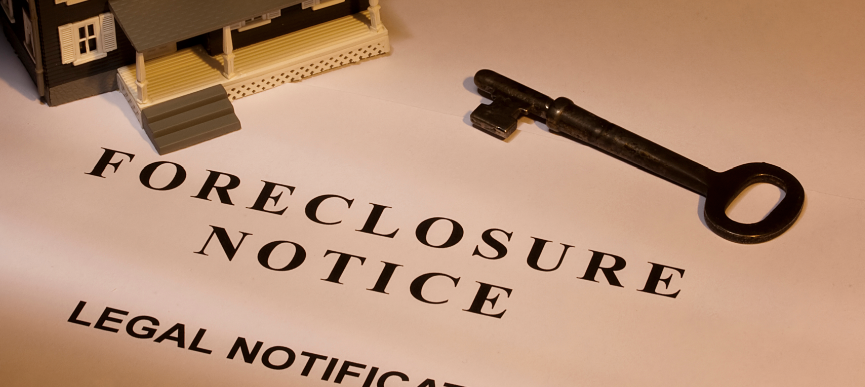
If you’ve gotten a foreclosure notice of default and want to know what the heck is going on, keep reading.
Basically, a foreclosure notice of default is a document that has to be filed by a lender to start the process of foreclosure.
Everyone who has an interest in the property is supposed to receive the foreclosure notice of default. That means any other loans, contractors who may have worked on on the house and are owed money, or lenders will get a copy of the foreclosure notice.
There’s a couple of places the notice needs to be posted. First, the notice of default will need to be attached to the house itself in a highly visible area. Usually, you’ll see these on the front doors or windows of a house. There also has to be a public notice of the foreclosure. This doesn’t have to happen until there is an actual date set for the auction, so typically it’s a little further in the process when that happens.
Resolving the notice of default early is the key to successfully navigating the foreclosure process. The earlier you get ahead of things, the better off you’ll be. If it’s really late in the process, and the house is scheduled for auction soon, there’s really only two ways out. Sell, or the bank takes the house by force. If it’s early enough on in the process, there’s even a chance you can work with the bank to find a way to keep the house. It’s happened more often than not the bank will work with you early on if you take action right when you get the notice of default.
The whole process of having an official document taped to your door and posted in the paper can be pretty intense for someone going through foreclosure. It is actually a really important step that protects consumers, though. People didn’t always get a head’s up the bank would be kicking them out via force.
Back before US law required a notice of default, people were sometimes foreclosed on without any warning.
In fact, it’s happened even in the past few years – at least one bank has accidentally foreclosed on the wrong property and kicked people out of their house without due process or warning. It’s even happened around Shreveport.
Or, the bank takes the right property, but the people who own it don’t even know about it and miss out on the chance at a huge asset. This can happen when the house needs to go through a succession and the heirs don’t get notified because they aren’t at the house, or the bank has the wrong address for them, or the bank doesn’t know about the need for a succession and is giving notice to someone who has recently passed. There are all kinds of errors the bank can make in a situation where the heirs are the ones who rightfully own the house.
If anyone has a lien on your house, creditors, contractors, or anyone else, they can lay claim on the property once notified it’s in default.
That’s why is so important to take action right away. You have the right to own your house. The sole power to decide what to do with it and when. If you get to it soon enough, you can absolutely resolve a notice of default especially in the Shreveport/Bossier area before it goes to auction.
Now to get technical, everything A to Z in the foreclosure process:
In Louisiana, the foreclosure process is typically a judicial one, meaning it involves court proceedings. The specifics of the foreclosure notice and the process may vary, but here is a general outline:
Payment Default:
- When a homeowner falls behind on mortgage payments, the lender may issue a Notice of Default (NOD). This official notice informs the borrower about the default on their mortgage agreement due to non-payment.
Acceleration Clause:
- Mortgage agreements usually include an acceleration clause, allowing the lender to demand the full loan amount if the borrower defaults on payments. The NOD often includes a demand for the entire outstanding loan balance.
Notice of Judicial Demand (Lis Pendens):
- In Louisiana, the foreclosure process typically starts with the filing of a lawsuit. The lender files a Notice of Judicial Demand (Lis Pendens) in the appropriate court, alerting the public that a legal action regarding the property is underway.
Service of Summons and Complaint:
- The borrower is served with a summons and complaint, initiating the formal legal foreclosure proceedings. The borrower has a specified period to respond to the lawsuit.
Court Judgment:
- If the borrower does not respond or if the court rules in favor of the lender, a judgment of foreclosure is issued. This judgment grants authority for the sale of the property to settle the outstanding debt.
Notice of Sheriff’s Sale:
- Following the court’s decision, the lender schedules a Sheriff’s Sale. The Notice of Sheriff’s Sale is published in a local newspaper, notifying the public of the impending foreclosure auction.
Sheriff’s Sale/Auction:
- The property is auctioned off at a public sale, with the highest bidder typically securing the property, subject to court confirmation.
Confirmation of Sale:
- Subsequent to the auction, the court must confirm the sale. Upon confirmation, the winning bidder receives a Sheriff’s Deed, effecting the transfer of property ownership.
It’s important to recognize that foreclosure laws and procedures can differ, and the information provided here is a general overview. If you are facing foreclosure or seeking specific details about the process in Louisiana, it is recommended to consult with a local real estate attorney. They can offer personalized guidance, ensuring a clear understanding of your rights and options in the foreclosure notice of default context.
Now that you’re educated, what’s next?
There are a few ways you can go about resolving a notice of default. It’s going to take a lot of calls, a lot of time, and a lot of mental energy. In the end, it’s all worth it to be able to save your house.
You’ll need to get in contact with the lender first. It’s important to get a payoff amount, how much you’re behind, what the mortgage balance is, and how far into the default process you are.
Next, ask if they have a way you can modify your payments, or if there’s another way to help get your payments to a spot you can manage them. Often times, the bank is very willing to work with you if you take action early.
After the loan modification process, you are usually in the clear as long as you can maintain payments and honor the new terms of the loan.
Selling for cash vs loan modification
It might make sense to sell for cash vs work with the bank. If you have enough equity you can safely sell and relocate to a new house that better fits your budget, that’s of course an option. A lot of times it’s helpful to at least see what a cash sale might look like before going through the process of a loan modification, once you get the notice of default.
A cash sale is typical easier, less time, and much more smooth than a loan modification. We can work to get your house sold before the bank takes it and give you some cash to walk away with, as well. You don’t even have to do any repairs, we would take it on as-is and still give you the top cash value for the house. If you’d like to explore all your options, a quote with us is free, and might help you decide which route you possibly want to take when faced with a notice of default.
Want to know more?
